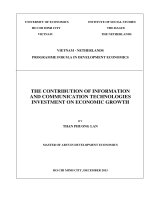Wiley the handbook of information and computer ethics may 2008 ISBN 0471799599 pdf
Bạn đang xem bản rút gọn của tài liệu. Xem và tải ngay bản đầy đủ của tài liệu tại đây (6.71 MB, 703 trang )
THE HANDBOOK
OF INFORMATION
AND COMPUTER ETHICS
Edited by
Kenneth Einar Himma and Herman T. Tavani
THE HANDBOOK
OF INFORMATION
AND COMPUTER ETHICS
THE HANDBOOK
OF INFORMATION
AND COMPUTER ETHICS
Edited by
Kenneth Einar Himma and Herman T. Tavani
Copyright © 2008 by John Wiley & Sons, Inc. All rights reserved
Published by John Wiley & Sons, Inc., Hoboken, New Jersey
Published simultaneously in Canada
No part of this publication may be reproduced, stored in a retrieval system or transmitted in any form or
by any means, electronic, mechanical, photocopying, recording, scanning or otherwise, except as
permitted under Section 107 or 108 of the 1976 United States Copyright Act, without either the prior
written permission of the Publisher, or authorization through payment of the appropriate per-copy fee to
the Copyright Clearance Center, Inc., 222 Rosewood Drive, Danvers, MA 01923, 978-750-8400,
fax 978-646-8600, or on the web at www.copyright.com. Requests to the Publisher for permission
should be addressed to the Permissions Department, John Wiley & Sons, Inc., 111 River Street,
Hoboken, NJ 07030, (201) 748-6011, fax (201) 748-6008.
Limit of Liability/Disclaimer of Warranty: While the publisher and author have used their best efforts in
preparing this book, they make no representations or warranties with respect to the accuracy or
completeness of the contents of this book and specifically disclaim any implied warranties of
merchantability or fitness for a particular purpose. No warranty may be created or extended by sales
representatives or written sales materials. The advice and strategies contained herein may not be suitable
for your situation. You should consult with a professional where appropriate. Neither the publisher nor
the author shall be liable for any loss of profit or any other commercial damages, including but not
limited to special, incidental, consequential, or other damages.
For general information on our other products and services please contact our Customer Care
Department within the U.S. at 877-762-2974, outside the U.S. at 317-572-3993 or fax 317-572-4002.
Wiley also publishes its books in a variety of electronic formats. Some content that appears in print,
however may not be available in electronic formats.
Library of Congress Cataloging-in-Publication Data:
The handbook of information and computer ethics / edited by Kenneth Einar Himma and
Herman T. Tavani.
p. cm.
Includes index.
ISBN 978-0-471-79959-7 (cloth)
1. Electronic data processing–Moral and ethical aspects. I. Himma, Kenneth Einar.
II. Tavani, Herman T.
QA76.9.M65H36 2008
004.01’9–dc22
2007044568
Printed in the United States of America
10 9 8 7 6 5 4 3 2 1
For my wife, Maria Elias Sotirhos, and my nieces, Angela and Maria Katinas
KEH
In memory of my mother-in-law, Mary Abate
HTT
CONTENTS
Foreword
xi
Deborah G. Johnson
Preface
xiii
Contributors
xvii
Introduction
xxiii
Kenneth Einar Himma and Herman T. Tavani
PART I: FOUNDATIONAL ISSUES AND METHODOLOGICAL
FRAMEWORKS
1. Foundations of Information Ethics
1
3
Luciano Floridi
2. Milestones in the History of Information and Computer Ethics
25
Terrell Ward Bynum
3. Moral Methodology and Information Technology
49
Jeroen van den Hoven
4. Value Sensitive Design and Information Systems
69
Batya Friedman, Peter H. Kahn Jr., and Alan Borning
PART II: THEORETICAL ISSUES AFFECTING PROPERTY,
PRIVACY, ANONYMITY, AND SECURITY
5. Personality-Based, Rule-Utilitarian, and Lockean Justifications
of Intellectual Property
103
105
Adam D. Moore
6. Informational Privacy: Concepts, Theories, and Controversies
131
Herman T. Tavani
7. Online Anonymity
165
Kathleen A. Wallace
vii
viii
CONTENTS
8. Ethical Issues Involving Computer Security: Hacking,
Hacktivism, and Counterhacking
191
Kenneth Einar Himma
PART III: PROFESSIONAL ISSUES AND THE
INFORMATION-RELATED PROFESSIONS
219
9. Information Ethics and the Library Profession
221
Kay Mathiesen and Don Fallis
10. Ethical Interest in Free and Open Source Software
245
Frances S. Grodzinsky and Marty J. Wolf
11. Internet Research Ethics: The Field and Its Critical Issues
273
Elizabeth A. Buchanan and Charles Ess
12. Health Information Technology: Challenges in Ethics, Science,
and Uncertainty
293
Kenneth W. Goodman
13. Ethical Issues of Information and Business
311
Bernd Carsten Stahl
PART IV: RESPONSIBILITY ISSUES AND RISK ASSESSMENT
337
14. Responsibilities for Information on the Internet
339
Anton Vedder
15. Virtual Reality and Computer Simulation
361
Philip Brey
16. Genetic Information: Epistemological and Ethical Issues
385
Antonio Marturano
17. The Ethics of Cyber Conflict
407
Dorothy E. Denning
18. A Practical Mechanism for Ethical Risk
Assessment — A SoDIS Inspection
429
Don Gotterbarn, Tony Clear, and Choon-Tuck Kwan
PART V: REGULATORY ISSUES AND CHALLENGES
473
19. Regulation and Governance of the Internet
475
John Weckert and Yeslam Al-Saggaf
20. Information Overload
David M. Levy
497
CONTENTS
21. Email Spam
ix
517
Keith W. Miller and James H. Moor
22. The Matter of Plagiarism: What, Why, and If
533
John Snapper
23. Intellectual Property: Legal and Moral Challenges of
Online File Sharing
553
Richard A. Spinello
PART VI: ACCESS AND EQUITY ISSUES
571
24. Censorship and Access to Expression
573
Kay Mathiesen
25. The Gender Agenda in Computer Ethics
589
Alison Adam
26. The Digital Divide: A Perspective for the Future
621
Maria Canellopoulou-Bottis and Kenneth Einar Himma
27. Intercultural Information Ethics
639
Rafael Capurro
Index
667
FOREWORD
The publication of The Handbook of Information and Computer Ethics signifies a
milestone in the field of computer ethics. The field began to emerge as a scholarly
field in the late 1970s and early 1980s. Joseph Weizenbaums Computer Power and
Human Reason (1976) was the first extended work to draw attention to the
potentially deep social implications of the new technology. During this period,
privacy had been subject to a number of major studies, including Alan Westin and
Michael Bakers Data Banks in a Free Society (1972). The first works by philosophers began to appear in the 1980s, and in 1985 Terrell Bynum published a special
issue of Metaphilosophy pulling together these first works and making them more
available to the philosophical community. That year, 1985, was also the year in
which my own Computer Ethics was first published.
Perhaps it is an understatement to say that in the twenty-plus years since the
appearance of these first works, the field of computer ethics has flourished
enormously. Of course, the development of the field has gone hand-in-hand with
the development of computer and information technology. In one of the seminal
articles in the field, Jim Moor identifies malleability as a key feature of computers;
that malleability has meant that computer and information technology has permeated almost every domain of human activity. And, of course, wherever the
technology goes, ethical issues can be found. While the flourishing of the field
of computer ethics is to be celebrated, growth inevitably means pressure to split
the whole into parts. The topics that need to be addressed continue to expand,
and perspectives from a wide range of disciplines are relevant. Thus, there is
pressure for the field to become splintered into subfields (for example, with a
distinction between computer ethics and information ethics); for scholars to
become specialists in one subfield (for example, to choose to become an expert
in privacy or intellectual property or professional ethics); or to have subfields
merged into already existing fields such as media studies, business ethics, information sciences, etc.
In this context, the publication of The Handbook of Information and Computer
Ethics is particularly important because it aims to keep the field whole. It is
intended to provide an overview of the issues and controversies in a field that has
become increasingly unwieldy. As a handbook, the volume defines the field as a
whole; it identifies foundational issues, provides theoretical perspectives, and
includes analyses of a range of applied and practical issues. The volume does this
through chapters by individuals who have been working in the field from the
xi
xii
FOREWORD
beginning, as well as works by scholars who have come to the field more
recently. For this reason, I applaud the efforts of Kenneth Himma and Herman
Tavani and welcome the publication of The Handbook of Information and
Computer Ethics.
DEBORAH G. JOHNSON
PREFACE
In the last 10 years, information and computer ethics has emerged as an important
area of philosophical and social theorizing, combining conceptual, metaethical,
normative, and applied elements. Interest in the area has increased dramatically in
computer science departments, philosophy departments, communications departments, business schools, information and library schools, and law schools. Information ethics has become one of the most important areas of applied philosophy in
terms of professional, student, and popular interest. Many of the most pressing new
ethical issues we face have arisen in connection with the use and development of new
information technologies. For example, debates about the ethics of online music file
sharing have led academics and ordinary citizens to reconsider the arguments for the
legitimacy of intellectual property protection. New developments in information
technology threaten privacy in ways that could not have been imagined 50 years ago,
raising new ethical issues about the rights to privacy and anonymity. The growing
dependence of large-scale economies on the Internet creates new vulnerabilities that
can be exploited by hackers, cybercriminals, and terrorists, raising novel ethical
issues about computer intrusions and security.
The Handbook of Information and Computer Ethics responds to this growing
professional interest in information ethics with 27 chapters that address both traditional and current issues in information and computer ethics research. Each chapter,
written by one or more of the most influential information ethicists, explains and
evaluates the most important positions and arguments on the respective issues. As a
result, the Handbook reader will be able to come away from each chapter with an
understanding of the major positions and arguments, their strengths and weaknesses,
and the authors original take on the issue. In addition, each chapter not only contains
useful summaries of the most important research on the topic but also makes an
important new contribution to the literature, and ends with a bibliography that
identifies the most important books and articles on the topic.
Because a number of very good anthologies on information and computer ethics
already exist, one might ask: Why another book of readings on ethical aspects of
information and computer technology? One justification for the book is that, as noted
above, each chapter in the present volume is written in a style that conforms to the
objectives of a handbook and thus provides the conceptual background that is often not
found in papers comprising other volumes. Consider that many papers included in
those volumes are compiled from disparate sources and, thus, can reflect various styles
and diverse objectives. With one exception, every chapter in this volume is an original
piece that was written specifically for the Handbook. As such, each paper provides an
xiii
xiv
PREFACE
accessible but sophisticated overview of the most important positions and supporting
arguments and objections, along with the authors state-of-the-art take on these
positions, arguments, and objections.
Another justification for this book is that existing anthologies tend to be narrower in
scope than The Handbook of Information and Computer Ethics. For example, many
anthologies cover only a limited set of topics that affect one or more subfields of
information ethics; as a result, these works often exclude some of the controversies and
issues that arise in information ethics as a broader field of inquiry. Consider that some
anthologies have focused on Internet- or cyber-specific issues involving information
ethics,1 while others have centered mainly on professional ethics issues affecting
responsibility.2 Other volumes are dedicated to information ethics concerns affecting
specific topical areas such as privacy, security, and property.3 Still other anthologies
have focused on ethical aspects of information technology that converge with ethicsrelated concerns affecting medicine and genetics/genomics research.4 And other
anthologies are dedicated to the examination of ethical issues in information technology that intersect either with disciplines, such as philosophy, or with new or emerging
fields, such as nanotechnology.5 So even though there is no shortage of anthologies that
examine ethical issues centering on these, and related, ethical aspects of information
technology, none addresses the breadth of topics covered in the present handbook.
The Handbook is organized into six main parts, which cover a wide range of
topics—i.e., from foundational concepts and methodological approaches in information ethics (at the theoretical level) to specific problem areas involving applied or
practical ethical issues.
At the theoretical level, conceptual frameworks underlying topical areas such as
intellectual property, privacy, and security are examined. These frameworks provide
Handbook readers with some conceptual tools needed to analyze more systematically
the kinds of issues examined in the chapters comprising the remaining sections of the
book. At the practical level, a number of contemporary controversies ranging from
professional-ethical issues to issues of responsibility, regulation, and access are
examined. For example, these chapters examine controversies affecting open-source
software, medical informatics and genetic research, cyber-conflict, risk assessment,
the digital divide, information overload, e-mail spam, online file sharing, plagiarism,
censorship and free speech, and so forth. Thus, Handbook readers will gain an
1
See Langford, D. (Ed.). Internet Ethics. Macmillan, 2000; Baird, R., Reagan, R., and Ramsower, S., (Eds.)
Cyberethics. Prometheus, 2000; Spinello, R. and Tavani, H. (Eds.). Readings in CyberEthics, 2nd ed. Jones
and Bartlett, 2004.
2
See Bynum, T. and Rogerson, S. (Eds.). Computer Ethics and Professional Responsibility. Blackwell,
2004.
3
See Moore, A. (Ed.). Information Ethics: Privacy, Property, and Power. University of Washington
Press, 2005; Himma, K. (Ed.). Internet Security: Hacking, Counter Hacking, and Society. Jones and
Bartlett, 2007.
4
See Goodman, K. (Ed.). Ethics, Computing, and Medicine. Cambridge, 1998; Tavani, H. (Ed.). Ethics,
Computing, and Genomics. Jones and Bartlett, 2006.
5
See Moor, J. and Bynum, T. (Eds.). Cyberphilosophy. Blackwell, 2002; Allhoff, F., Lin, P., Moor, J. and
Weckert, J. (Eds.). Nanoethics. Wiley, 2007.
ACKNOWLEDGMENTS
xv
understanding of both the general frameworks and specific issues that define the fields
of information and computer ethics.
ACKNOWLEDGMENTS
The editors would like to acknowledge the support they received from their respective
institutions while composing the Handbook. Kenneth Himmas work on this project
was partially supported by Seattle Pacific University through a Faculty Research
Grant, which released him from teaching duties and made it possible for him to devote
most of his efforts to this project. Herman Tavani also received institutional support in
the form of a Summer Faculty Research and Professional Development Grant from
Rivier College, during the summer of 2006, to work on the Handbook. The editors are
very grateful to Seattle Pacific University and Rivier College, respectively, for the
institutional support they received.
The editors are especially grateful to the contributing authors, without whom this
volume would not exist. The contributors willingness to revise drafts of their papers to
comply with the specific objectives of this handbook is greatly appreciated. We also
appreciate the extraordinary patience, as well as the ongoing cooperation and support,
the contributors displayed throughout the long, and sometimes tedious, process
required to complete this book.
We are also grateful to the editorial staff at Wiley, especially to Paul Petralia,
Anastasia Wasko, and Whitney Lesch, for managing to keep the book on a reasonable
schedule, despite some of the obstacles that we encountered along the way.
Finally, we wish to thank our spouses, and our families, for their unwavering
support throughout this project. To them, we dedicate this book.
K. E. H.
H. T. T.
August, 2007
Contributors
Alison Adam, PhD, is Professor of Information Systems and Director of
the Informatics Research Institute at the University of Salford, UK. Her recent
publications include Gender, Ethics and Information Technology (Palgrave Macmillan, 2005).
Yeslam Al-Saggaf, PhD, is a Senior Lecturer in Information Technology at Charles
Sturt University and a Research Fellow at the Centre for Applied Philosophy and
Public Ethics. His research interests lie in the areas of online communities (both
social and political) and the online political public sphere in the Arab world.
Alan Borning, PhD, is Professor in the Department of Computer Science and
Engineering at the University of Washington, adjunct professor in the Information
School, and Co-Director of the Center for Urban Simulation and Policy Analysis. His
current research interests are in human–computer interaction and designing for human
values, particularly as applied to land use, transportation, and environmental
modeling.
Maria Canellopoulou-Bottis, PhD, is a Lecturer at the Information Science Department of the Ionian University, Greece. Her recent publications include The Legal
Protection of Databases (2004) and Information Law (2004), in Greek, and numerous
articles in Greek and foreign journals.
Philip Brey, PhD, is Professor of Philosophy and Director of the Center for
Philosophy of Technology and Engineering Science at the University of Twente, The
Netherlands. He is a member of the board of the International Society for Ethics and
Information Technology and the author of numerous articles in philosophy of
technology and computer and information ethics.
Elizabeth A. Buchanan, PhD, is Associate Professor and Director, Center
for Information Policy Research, School of Information Studies, University of
Wisconsin-Milwaukee. She is Co-Director of the International Society for Ethics
and Information Technology (INSEIT), Chair, Ethics Working Group, Association of
Internet Researchers (AoIR), and Chair, Intellectual Freedom Round Table, Wisconsin Library Association.
Terrell Ward Bynum, PhD, is Professor of Philosophy at Southern Connecticut
State University and Director of the Research Center for Computing and Society.
His recent publications include Computer Ethics and Professional Responsibility
(Blackwell, 2004), coedited with Simon Rogerson, and Cyberphilosophy: The
xvii
xviii
CONTRIBUTORS
Intersection of Philosophy and Computing (Blackwell, 2002), coedited with James
Moor.
Rafael Capurro, PhD, is Professor of Information Science and Information Ethics
at Stuttgart Media University (Germany) and Director of the International Center for
Information Ethics (ICIE). His recent publications include Localizing the Internet:
Ethical Aspects in Intercultural Perspective (Fink Munich, 2007), coedited with J.
Fruehbauer and T. Hausmanninger, as well as numerous book chapters and journal
articles.
Tony Clear, is Associate Head of School in the School of Computing and Mathematical Sciences at Auckland University of Technology, New Zealand. He edits a regular
column in the ACM SIGCSE Bulletin, is on the editorial board of Computer Science
Education, and has research interests in software risk assessment.
Dorothy E. Denning, PhD, is Professor of Defense Analysis at the Naval Postgraduate School. She is the author of Information Warfare and Security (Addison Wesley,
1999) and of numerous articles and book chapters relating to conflict in cyberspace
and information security.
Charles Ess, PhD, is Distinguished Research Professor and Professor of Philosophy
and Religion at Drury University. His recent publications include Information
Technology Ethics: Cultural Perspectives, coedited with Soraj Hongladarom (Idea
Group, 2007), and special issues of Ethics and Information Technology devoted to
cross-cultural approaches to privacy and to Kantian approaches to topics in information ethics.
Don Fallis, PhD, is Associate Professor of Information Resources and Adjunct
Associate Professor of Philosophy at the University of Arizona. His articles have
appeared in the Journal of Philosophy, Philosophical Studies, Library Quarterly,
and the Journal of the American Society for Information Science and Technology.
Luciano Floridi, PhD, holds the research chair in philosophy of information at the
Department of Philosophy of the University of Hertfordshire and is Fellow of St. Cross
College, Oxford University. His books include the Blackwell Guide to the Philosophy
of Computing and Information (2004) and The Philosophy of Information (Oxford
University Press, forthcoming).
Batya Friedman, PhD, is Professor in the Information School, an Adjunct Professor
in the Department of Computer Science & Engineering, and Co-Director of the Value
Sensitive Design Research Lab at the University of Washington. Her recent publications include the development of an open source privacy addendum (Ubicomp, 2006),
the value-sensitive design of a corporations groupware systems (GROUP, 2007), and
numerous journal articles and book chapters.
Kenneth W. Goodman, PhD, is Associate Professor of Medicine and Philosophy at
the University of Miami, where he directs the Bioethics Program. He has written
extensively about ethics and health informatics, including hospital, public health, and
genetics applications.
CONTRIBUTORS
xix
Don Gotterbarn, PhD, Director of the Software Engineering Ethics Research
Institute at East Tennessee State University, has been active in computer ethics for
more than 20 years. Most recently, his work has focused on ethical decision support
methodologies.
Frances S. Grodzinsky, PhD, is Professor of Computer Science and Information
Technology at Sacred Heart University and Co-Director of the Hersher Institute of
Ethics. Her recent publications include numerous book chapters and journal
articles.
Kenneth Einar Himma, PhD, JD, is Associate Professor of Philosophy at Seattle
Pacific University and formerly taught at the University of Washington in the
Information School, Law School, and Philosophy Department. He has published
more than a hundred journal articles and is on the editorial boards of several journals on
information technology and ethics.
Deborah G. Johnson, PhD, is the Anne Shirley Carter Olsson Professor of Applied
Ethics and Chair of the Department of Science, Technology, and Society at the
University of Virginia. Her anthology, Technology & Society: Engineering our
SocioTechnical Future (coedited with J. Wetmore), is forthcoming from MIT Press
in 2008, and she is currently working on the fourth edition of Computer Ethics
(forthcoming from Prentice Hall).
Peter H. Kahn, Jr., PhD, is Associate Professor of Psychology at the University of
Washington. His books include The Human Relationship with Nature: Development
and Culture (MIT Press, 1999) and Children and Nature: Psychological, Sociocultural, and Evolutionary Investigations (MIT Press, 2002), and his research
publications have appeared in such journals as Child Development, Developmental
Psychology, Human-Computer Interaction, and Journal of Systems Software.
Choon-Tuck Kwan is a Lecturer at the Auckland University of Technology (New
Zealand) and Manager of the New-Zealand-based Software Engineering Practice
Improvement Alliance. He was formerly a senior IT manager in a large governmental
Statutory Board in Singapore.
David M. Levy, PhD, is Professor in the Information School of the University of
Washington. He is the author of Scrolling Forward: Making Sense of Documents in the
Digital Age (Arcade, 2001).
Antonio Marturano, PhD, an Adjunct Professor of Business Ethics at the Faculty of
Economics, Sacred Heart Catholic University of Rome, has held several academic
posts at universities in the United States, United Kingdom, and Italy. His main research
area is applied ethics, with a special focus on ethical and legal problems spanning
genetics and information technology.
Kay Mathiesen, PhD, teaches courses on information ethics and policy at the School
of Information Resources and Library Science, University of Arizona. Her articles
have appeared in journals such as Library Quarterly, Computers and Society, the
Annual Review of Law and Ethics, and Business Ethics Quarterly.
xx
CONTRIBUTORS
Keith W. Miller, PhD, is Professor of Computer Science at the University of
Illinois at Springfield and Editor of IEEE Technology and Society Magazine. His
research interests include computer ethics, software testing, and computer science
education.
James H. Moor, PhD, is Professor of Philosophy at Dartmouth College, an Adjunct
Professor with the Centre for Applied Philosophy and Public Ethics at The Australian
National University, and President of the International Society for Ethics and
Information Technology. His ethical writings are on computer ethics, artificial
intelligence, and nanotechnology.
Adam D. Moore, PhD, is Associate Professor in the Philosophy Department and the
Information School at the University of Washington. He is the author of Intellectual
Property and Information Control (Transaction Pub. University, hardback 2001,
paperback 2004), and editor of Intellectual Property: Moral, Legal, and International
Dilemmas (Rowman and Littlefield, 1997) and Information Ethics: Privacy, Property,
and Power (The University of Washington Press, 2005).
John Snapper, PhD, is Associate Professor of Philosophy and an Associate of the
Center for the Study of Ethics in the Professions. He is coeditor of Owning Scientific
and Technical Information (Rutgers Press, 1989) and Ethical Issues in the Use of
Computers (Wadsworth, 1985) and author of a numerous journal articles on related
subjects.
Richard A. Spinello, PhD, is Associate Research Professor in the Carroll School of
Management at Boston College. He has written and edited seven books on ethics and
public policy, including CyberEthics: Morality and Law in Cyberspace (Jones and
Bartlett, third edition, 2006) and Intellectual Property Rights in a Networked World
(Idea Group, 2005).
Bernd Carsten Stahl, PhD, is Reader in Critical Research in Technology in the
Centre for Computing and Social Responsibility at De Montfort University, Leicester,
UK. As the Editor-in-Chief of the International Journal of Technology and Human
Interaction, his interests cover philosophical issues arising from the intersections of
business, technology, and information.
Herman T. Tavani, PhD, is Professor of Philosophy at Rivier College, a Lecturer in
the Carroll School of Management at Boston College, and a visiting scholar/ethicist in
the Department of Environmental Health at the Harvard School of Public Health. His
recent books include Ethics and Technology (Wiley, second edition 2007) and Ethics,
Computing, and Genomics (Jones and Bartlett, 2006).
Jeroen van den Hoven, PhD, is Professor of Moral Philosophy at Delft University of
Technology (the Netherlands). He is the Editor-in-Chief of Ethics and Information
Technology (Springer), Scientific Director of the Centre of Excellence for Ethics and
Technology of the three technical universities in the Netherlands, and a member of the
High Level Advisory Group on ICT (ISTAG) of the European Commission in
Brussels.
CONTRIBUTORS
xxi
Anton Vedder, PhD, is Associate Professor of Ethics and Law at the Tilburg Institute
for Law, Technology, and Society of Tilburg University (the Netherlands). His recent
publications include NGO Involvement in International Governance and Policy:
Sources of Legitimacy (Martinus Nijhoff, 2007) and several book chapters and journal
articles on privacy, reliability of information, accountability, and legitimacy of newly
emerging governance regimes.
Kathleen A. Wallace, PhD, is Professor of Philosophy at Hofstra University. Her
recent publications include “Educating for Autonomy: Identity and Intersectional
Selves,” in Education for a Democratic Society (Rodopi Press, 2006), “Moral Reform,
Moral Disagreement and Abortion” (Metaphilosophy, 2007), and “Morality and the
Capacity for Symbolic Cognition,” Moral Psychology (MIT Press, 2007).
John Weckert, PhD, is Professor of Computer Ethics and Professorial Fellow at the
Centre for Applied Philosophy and Public Ethics, Charles Sturt University, Australia.
He is founding editor-in-chief of the journal Nanoethics: Ethics for Technologies that
Converge at the Nanoscale, and author of numerous book chapters and journal articles.
Marty J. Wolf, PhD, is Professor of Computer Science and the Computer Science
Program Coordinator at Bemidji State University in Minnesota. He has over 15 years
experience using and administering Linux and has published numerous book chapters
and journal articles in areas ranging from graph theory to computer ethics.
INTRODUCTION
KENNETH EINAR HIMMA and HERMAN T. TAVANI
As noted in the Preface to this volume, The Handbook of Information and Computer
Ethics covers a wide range of topics and issues. The 27 chapters that comprise
this work are organized into six main parts: I. Foundational Issues and Methodological Frameworks; II. Theoretical Issues Affecting Property, Privacy, Anonymity,
and Security; III. Professional Issues and the Information-Related Professions;
IV. Responsibility Issues and Risk Assessment; V. Regulatory Issues and Challenges; and VI. Access and Equity Issues.
I FOUNDATIONAL ISSUES AND METHODOLOGICAL FRAMEWORKS
Part I, comprising four chapters, opens with Luciano Floridis examination of some
key foundational concepts in information ethics. Floridi points out that the expression
“information ethics,” introduced in the 1980s, was originally used as a general label to
discuss issues regarding information (or data) confidentiality, reliability, quality, and
usage. He also notes that “information ethics” has since come to mean different things
to different researchers working in a variety of disciplines, including computer ethics,
business ethics, medical ethics, computer science, the philosophy of information, and
library and information science. Floridi is perhaps best known among computer
ethicists for his influential methodological (and metaethical) framework, which he
calls Information Ethics or IE. He contrasts his framework with traditional views that
have tended to view IE as either an “ethics of informational resources,” an “ethics of
informational products,” or an “ethics of the informational environment.” Floridi
argues that his alternative view of IE, as a “macroethics,” is superior to the various
microethical analyses of IE that have been suggested.
Floridis discussion of foundational issues in IE is followed by Terrell Ward
Bynums chapter, “Milestones in the History of Information Ethics.” Bynum is
generally considered to be one of the “pioneers” in computer ethics, helping to
establish the field as an independent area of applied ethics in the 1980s. In Chapter 2,
Bynum argues that the origin of computer and information ethics can be traced to the
work of philosopher/scientist Norbert Wiener, who, during World War II, worked with
a group of scientists and engineers on the invention of digital computers and radar. His
chapter begins with a discussion of Wieners “powerful foundation” for information
xxiii









